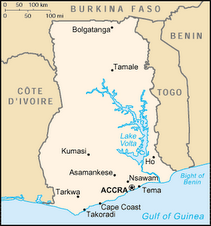 The removed seed.
The removed seed.This week we saved the life of a seven month old girl. Her mother was preparing a meal when the child, who was crawling on the ground, started choking and coughing. The following day the child was brought to the hospital in respiratory distress. The X-ray showed a large object in the pharynx. The nurse anesthetist did not want to do the child until after a blood transfusion and even afterward he refused to do the procedure that day. Arguments with both him and the general surgeon could not change their minds. Later that night a visiting anesthesiologist arrived and when the child began to fail, he readily agreed to help. A large "Baba" seed was extracted from the child's throat and the child improved. A month before we lost a 13 month old who aspirated a corn seed into the trachea. We originally referred this child to the capital city of Accra, but the child was brought to the village to die. We called the child back, but were unable to remove the corn seed which totally obstructed the trachea. I have to focus on the ones that are saved rather than despair over failures.

